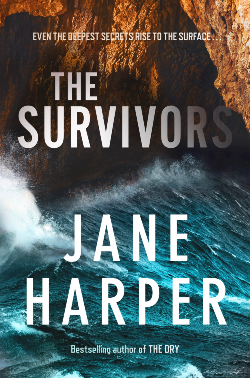
Before The Survivors, Jane Harper had written three books: two set in drought stricken and lonely Australian wilderness, and one set in dense forestation. The drier books were intense and deep, but the forest floundered in not being able to locate a purpose for its characters or a compelling setting for them to come apart in. In The Survivors, Harper offers readers a new environment in the cold beaches of Tasmania, and she works it. That it's her third book about a pariah returning to the society that shunned them to reckon with their past is something that we'll politely gloss over at this point.
Kieran Elliott returns to the small Tasmanian town of Evelyn Bay to help his mother pack up the family home and send his father into care. Twelve years after the events that drove him away, Kieran is still looked down upon by the citizens of Bay — but when a body turns up on the shore, he realises that he may need to reassess his role in the past and his place in society.
The Survivors is Jane Harper's first novel with no connection whatsoever to Aaron Falk, not even the tangential reference that provided some background to The Lost Man, but it does not suffer for it. Where Harper had written herself into a corner by introducing a policeman who was essentially an auditor, relegated to stuffy "financial crimesâ€, here she has freed the reader with a character unencumbered by such petty commitments as employment that he has to attend to or a meaningful life on the mainland.
There are moments in The Survivors that horrify, but not for reasons of narrative suspense: at one point Kieran goes swimming in the ocean and leaves his baby unattended in a sleeping bag on the shore, which is likely to trigger a visceral response even in those without any children to their name. This is not used as an example of Kieran being thoughtless or careless with his defenceless charge, but simply as something that he does. It is such a strange inclusion that it has to be remarked upon, the sort of event that somehow survived however many editorial passes. The rest of the danger — from tide levels and unmapped caves — makes for a more primal, logical source of fear and peril, but it is the baby on the beach that lingers.
The Survivors is Harper's most literary piece to date, a character study that often forgets that it is ostensibly a crime novel. The vivisection that Harper performs on Kieran's flayed soul is comprehensive, and Harper digs deep into the nature of trauma, survivor's guilt, and toxic masculinity that desperately attempts to repair itself. With the main character never in the mix for the modern murder, one doesn't have to doubt him; Harper does not withhold his past for long, so it is difficult to see Kieran as any sort of monster.
The flip side of this depth of character means that The Survivors doesn't always quite work from the perspective of a crime novel. It is a double or triple whodunnit across multiple timelines, and the reveals are somewhat underwhelming because Harper hasn't put in the effort to beef up the support cast. Kieran is a multi-dimensional character, and some of the people in his immediate orbit have enough shade to them, but there are others defined by their ability to blend into the background and go entirely unnoticed. Kieran has loyal friends who never betrayed him, but they are mostly never more than ciphers, with names and personalities that are almost interchangeable.
Despite its point of difference, Evelyn Bay is also Harper's least convincing location to date. Unlike the dry locales, this pointedly wet one is not so vividly illustrated: the caves that are pivotal to the plot are inconsistently presented: sometimes they seem easy to reach from the land, others perilously so, and others still characters have to take a boat out to them, independent of the tide. For simplicity's sake, Evelyn Bay has only one real business, the Surf and Turf, and it does a lot of heavy lifting for the town's commerce and social life. Harper only gives the vaguest sense of where anything is relative to anything else, but she does get bonus points for presenting little seen parts of Tasmania — and a week ahead of Tasmanian native Richard Flanagan's new release, no less.
Having done all of the hard work of setting up Keiran, Harper finishes The Survivors in a hurry, drowning the reader in a torrent of exposition that solves everything in a few broad strokes. At the eleventh hour, it becomes clear that The Survivors is Harper butting against the boundaries of the genre that made her famous. It is not impossible to write a literary crime novel — and, as long as an author doesn't think that they're "slumming it†to prove how easy it is, their kind is welcome — but the murder that is supposed to drive The Survivors is never much more than window dressing. Though it may be time for Harper pack the pariahs away, at the very least The Survivors stands as a thorough character study and a passable mystery.


